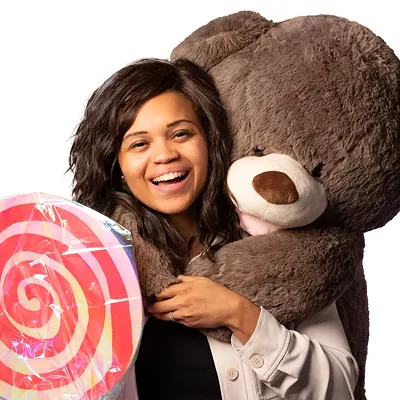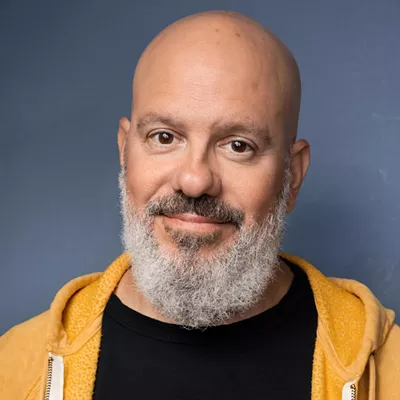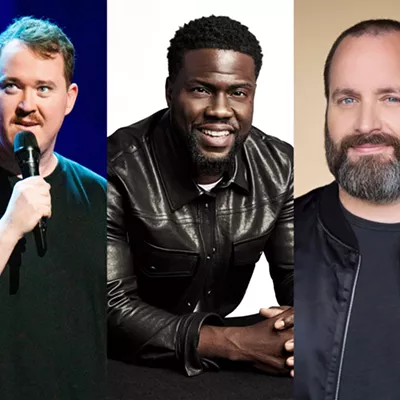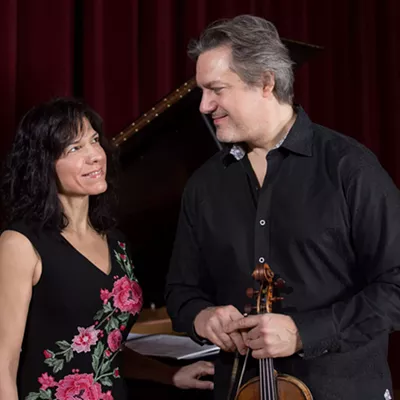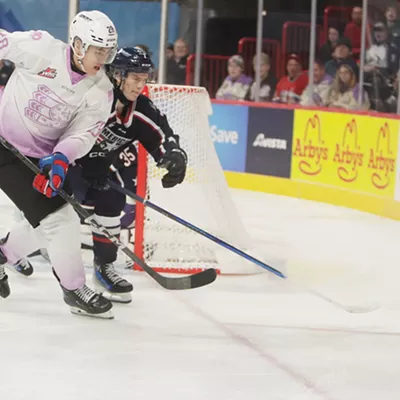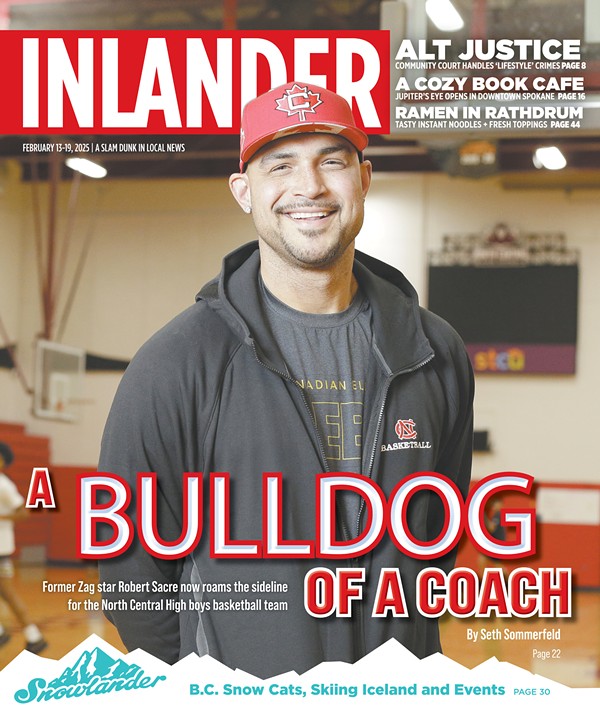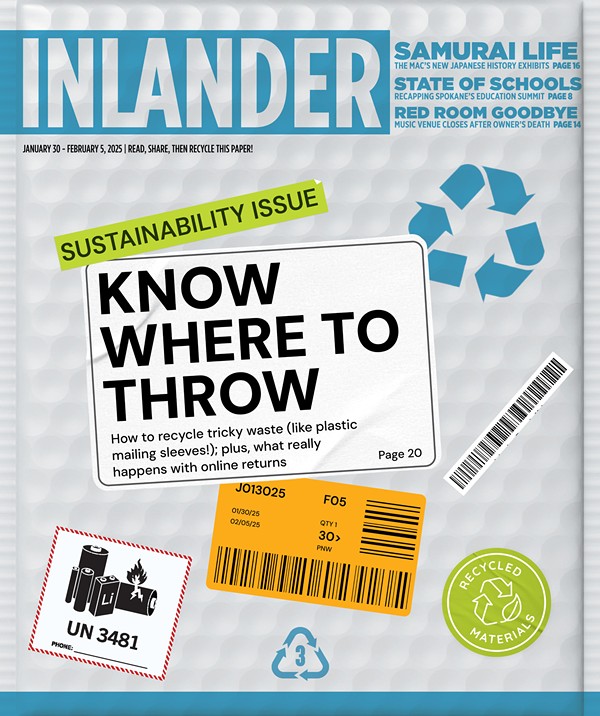It might be frowned upon to talk about, but many of us joined the "Move Back In With Your Parents During COVID Club." But, then again, most of us aren't very successful stand-up comedians in our 30s.
Nikki Glaser became a known figure in the comedy world with her hilarious Comedy Central celebrity roasts and uproarious appearances on talk shows like Conan (oftentimes making hosts flustered with her frank humor about sex). But when the pandemic hit, she decided to relocate back to her hometown of St. Louis to be with her folks. Even being away from the New York and LA comedy hubs didn't slow down her career. She turned the move into a reality show on E!, Welcome Home Nikki Glaser?, hosts her The Nikki Glaser Podcast and the reality dating show FBOY Island, and even competed on The Masked Singer.
Before she brings her delightful brash humor to town with a stop at The Fox, we caught up with the stand-up to chat about the unusual empathy of her boundary-pushing material.
INLANDER: Did moving back home with your parents during the pandemic change your material at all?
GLASER: Me moving back to St. Louis and staying here has been just a shift to focus on things that aren't work-related, because I moved here so I could avoid work, really, and be around my family more often. And I don't know that it's like shown up in my act. I would say the past five to seven years in stand-up, I've been really able to talk about what I want to talk about and just kind of do what I want to do. So I think it's just an extension of that — just going toward what feels best.
Do you think that shift has become the main evolution to your material as you've become more established?
Yeah, I think they want authenticity. A lot of comedians are very successful, but they're performative. They're kind of doing what's trendy in comedy, whether it be like the way they act on stage or the things they talk about. And I've done that before, too, and I'm susceptible to it even now. I think what everyone wants in their favorite artists is that the artist is coming from a real place. I really have the freedom to just discuss whatever the hell I want.
And oftentimes, it is about sex, because that used to be my favorite thing to talk about, because it's just the most interesting thing. I think that's what angered me a lot early on was just being dismissed as someone who's just like a sex comic. Because I think of sex comics as like, "Oooo this will make everyone titillated! Oh, I'm gonna be edgy!" And it was never my goal to be edgy, I just was edgy. But I think when people write off female comics as like "all the talk's about sex," it just frustrates me.
It's very much like Taylor Swift being written off as like "all she does is write breakup songs." And you go, "Wow, when men write breakup songs, they sure don't get any shit for doing it." They don't get called out for doing it. And so I felt like it's just a way to dismiss women and write us off as trying to be people pleasers. And I'll tell you, it does not please many people to talk about sex as a woman. It's made my career a lot harder, actually.
I really don't like to make people uncomfortable. I don't like to make people cringe. I don't like to make people groan. I don't like people leaving my show because they're offended. There are a lot of male comics who f—ing love that. They love when people heckle them or they offend people and people write blogs about them. I get really hurt when I hurt people.
It threatens people because we’re not men. And I’m not one to play the woman card that often. But yeah, it’s sexism when people can’t handle women talking honestly about stuff. And I really have no interest in hearing a man dismiss me.
I often do interviews, and it’s just like an angry man on the other line who can’t help but just want to shame me over and over. “Oh, you talk a lot about sex. I could barely get through it. My daughter was in the room, I had to turn it off.” And it’s like, well why are you watching it with your f—-ing daughter in the room? Do you watch The Last of Us with your daughter in the room? Why aren’t you talking about how that is so bad?
There’s some reason why [they think] women just need to be prim and proper all the time. It’s like, no, this is a setting in which I am filthy. But I don’t do this in churches. I can behave myself around children.
I just hate any kind of association with like, “I’m trying to be edgy.” It grosses me out. And I get why people do it, because some people don’t really have an identity and do try to be edgy. I tried to be edgy when I first started because I just didn’t have my own sense of humor yet. So I was just trying to be Sarah Silverman, because I liked that kind of humor. But now I really don’t like to make people uncomfortable. I don’t like to make people cringe. I don’t like to make people groan. I don’t like people leaving my show because they’re offended. There are a lot of male comics who f—-ing love that. They love when people heckle them or they offend people and people write blogs about them. I get really hurt when I hurt people. I don’t like to do it.
There’s probably some built-in sexism where folks often use comedy as a defense mechanism when they feel like an outsider, so some people inherently get upset when they see an attractive person being really funny.
Yeah, I think that’s true. People just project. Generally, the loudest people who are so against what I do are usually the biggest perverts, because you kind of only hate what you hate about yourself. So usually I hear groans or “eww” or “she’s just not for me,” I’m like “Oh, because I make you think about the part of yourself that you hate. Because you feel so much shame about talking about sex.” People being uncomfortable hearing about sex, I just don’t understand that unless you’re asexual and you don’t like sex at all. Otherwise, I’m just like, isn’t it why we all exist? Didn’t all of our dads penetrate our moms and have a romantic moment? How are we just walking around in denial of all this? So I think usually like the people that hate me the most are probably the most repressed and the most, like, perverted and have the most to hide. It’s kind of funny in that way.
So what are the things that you're interested in talking about on stage now?
And I think as a woman, wanting to have kids it was always something I put off because I just never wanted them and I was always waiting for myself to want them and that time has just never come, so I’m kind of grappling with the idea of like, if I don’t do it now I can never have my own.
And just aging in general, like my face falling every year a little bit more and just celebrity culture of body positivity yet, they still celebrate anorexics and Gwyneth Paltrow is still making millions off of bone broth, and yet we all are supposed to act like Lizzo all the time. I’m frustrated by this mixed messaging paradox of loving yourself yet trying not to age.
And also pedophilia. I talk a lot about that because I’m fascinated by that. I think that it’s the one thing that no one talks about, really. And I think it’s like the biggest scourge on society. And I think it’s the next thing that I want to tackle in my act, to make people that have been molested or know people have been molested or just have dealt with any kind of childhood sexual abuse, to be more comfortable talking about it and open with it. I haven’t myself been a victim of child sex abuse. But I think that’s why I can talk about it, and make those people feel less weird about what they’ve been through or less victimized.
It isn’t hard to make jokes about it. It’s hard to make 10 minutes of jokes about it, and come in and not offend anyone or have anyone that’s been a victim leave the show crying. And I’ve achieved that. And it’s, I think it’s actually empowering. And I offer a lot of tips for parents to avoid their kids getting molested, because I read a lot about it. Because I’m fascinated by it in the same way that people are fascinated by murder, and I have nieces and nephews and I want to protect them. So I’ve learned a lot.
So I’ve made a big chunk of my act about the most uncomfortable topic possible. And I do meet-and-greets after the show, and I have people telling me about their molestations as if they were like ‘I got into a fender bender.’ They’re able to talk about it as flippantly as that, which I think is important because it is like a car accident — you didn’t do anything, it wasn’t your fault. It was just an unlucky thing that happened to you. And it’s nice that people can kind of casually talk about it. Not that it’s not a traumatic thing that some people struggle with talking about, but I think that is all coming from a place of shame for victims.
And so I just always am working toward listing shame, whether it’s shame around sex, shame around being victimized, shame around your weight, shame around your age, shame around not wanting kids. Because I feel so much shame all the time. And I think I’m just trying to be the thing that I probably need to hear, you know? And it actually works because it’s like, it turns out, things I struggle with are very common things. And the beauty of stand-up is I present these things that I’m having a hard time liking myself about. I have suicidal thoughts. I talk a lot about suicidal thoughts in my act. And it forgives me, and it makes it so I don’t struggle with those alone. And then I have people laughing at my suicidal thoughts and the jokes I’m doing around it.
I go to therapy a lot of times, and I’ll say some, like, detail of my life and the therapist is always like, ‘Oh my God, thank you so much for sharing that with me! This is a safe place.’ And I’m like, ‘Oh, I just said this on a podcast an hour ago too, so I don’t really care.’ Like I think my lack of shame about admitting things about my life is contagious.
Is there anything else you’d like to add?
I always kind of do a pitch for people who’ve never gone to see stand-up comedy. I just encourage people to do it, because if you suffer with depression, which you probably do, because the reader lives in the Pacific Northwest, don’t underestimate going to a place and laughing for an hour and a half straight and how good that is for your mental health.
And then I will also tell people that my show is a perfect thing to go alone to. I think a lot of people miss out on going to shows because they don’t have a friend or a family member that can go with them. And they just feel like, ‘Oh, if I go alone, I’ll look like such a loser.’ And I mean, we all struggle with that kind of social anxiety. But my show is not the kind of show where I’ll see you sitting alone and make fun of you. If anything, if you go to the merch booth and you say that you went alone, I will give you a free meet-and-greet to reward you for going alone, because I think it’s cool. I just implore people to not miss out on things because you can’t find a friend. Friends are hard to make, and you shouldn’t miss out on fun events.
I always tell people, just pretend you’re working for a newspaper and you’re reviewing it. If you’re having that much anxiety, about like, ‘Oh I’m a loser’ just say like, ‘Oh, I’m doing a report on this or I’m covering this to the local paper,’ and everyone will think you’re cooler. But there’s nothing to be ashamed about going to things alone. ♦
Nikki Glaser • Fri, March 24 at 7 pm • $40 • The Fox Theater • 1001 W. Sprague Ave. • foxtheaterspokane.org




